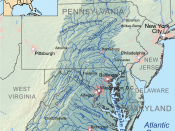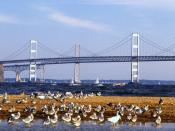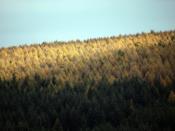Of all the source populations, clearly the ones destined to become the most influential were those who chose to emigrate here from merrie olde England. It was the English colonies along the Atlantic seaboard which came to dominate, and which succeeded in spreading their culture, including their language, from sea to sea. Certainly all of the others have contributed enormously to this complex being we call American culture, but the way of the English, Anglo-Saxon culture, succeeded in becoming the overarching influence in the development of the basic institutions of American life.
It all started at Jamestown, as we have already seen. From the seed of Jamestown, planted on the edge of Chesapeake Bay, the Virginia colony would grow. Here a whole new way of life took form, based on plantation farming and the employment of slave labor. It came to be known as the "Southern" way of live.
Jamestown was the first baby in the cradle, but another baby joined it in the cradle very soon. That other baby was Plymouth, an English settlement up on the cold shores of Cape Cod, founded only twelve years after Jamestown. From Plymouth would grow the colony of Massachusetts, and from Massachusetts would develop all of New England, a very different way of life from that of the Chesapeake. This "Northern" way of life was based on the family farm, small villages, and an active trading economy. Above all, it was influenced by a strong Protestant faith, stemming from the Puritans who first settled the land. Modern American culture (for better or for worse) still has deep roots in the Puritan New England of colonial times.
In Unit Two we will be examining the multifarious character of the colonial world as it developed, with special attention given to that part of it known as New England. Of special importance with respect to ALL parts of developing America, wherever they may be in place and time, was the influence of the frontier, the interface between the "developed" place and the wild lands beyond. The frontier was always moving, of course, but, until the end of the nineteenth century, it was always there somewhere. Dealing with it has profoundly influenced the developing character of American culture. This theme enters the story right at the very beginning.





